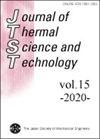Chaos theory-based time series analysis of in-cylinder pressure and its application in combustion control of SI engines
IF 1.2
4区 工程技术
Q3 THERMODYNAMICS
引用次数: 6
Abstract
Combustion control is a significant topic for achieving high efficiency and low emissions of internal combustion engines. Recently, in-cylinder pressure sensor-based closed-loop control strategies have become the preferred solution. However, their practical applications in automotive industries are limited due to the intensive acquisition of pressure series for a whole cycle and subsequent calculation of combustion indicators. This paper proposes a method for in-cylinder pressure information extraction and combustion phase estimation of spark ignition (SI) engines based on pressure measurements at several points coordinated by the crank angle. First, nonlinear dynamics analysis is introduced to analyze the system of in-cylinder pressure evolution, which is proved to be a deterministic nonlinear dynamic system with chaotic characteristics. Then, a 3-dimensional system state variable is determined to replace the pressure series during combustion. Second, with the determined system state variable, the in-cylinder pressure series during combustion and the combustion phase are learned and estimated by a machine learning method, namely, extreme learning machine (ELM). As a result, only pressure measurements at 3 points and ELM estimation models are required, instead of intensive data acquisition and calculation. The experimental validations carried out on a gasoline engine test bench have proved that the reconstruction and estimation results are accurate and that the method can perform well in real-time combustion control.基于混沌理论的缸内压力时间序列分析及其在内燃机燃烧控制中的应用
燃烧控制是实现内燃机高效、低排放的重要课题。近年来,基于缸内压力传感器的闭环控制策略已成为首选的解决方案。然而,由于需要大量获取整个循环的压力级数以及随后的燃烧指标计算,它们在汽车工业中的实际应用受到限制。提出了一种基于曲柄角协调的多点压力测量的火花点火发动机缸内压力信息提取和燃烧相位估计方法。首先,引入非线性动力学分析方法对缸内压力演化系统进行分析,证明了缸内压力演化系统是一个具有混沌特性的确定性非线性动力学系统。然后,确定一个三维系统状态变量来代替燃烧过程中的压力序列。其次,在确定系统状态变量的情况下,采用极限学习机(extreme learning machine, ELM)的机器学习方法,对燃烧过程和燃烧阶段的缸内压力序列进行学习和估计。因此,只需要3点压力测量和ELM估计模型,而不需要大量的数据采集和计算。在某汽油机台架上进行的实验验证表明,该方法重构和估计结果准确,能够很好地实现燃烧的实时控制。
本文章由计算机程序翻译,如有差异,请以英文原文为准。
求助全文
约1分钟内获得全文
求助全文
来源期刊
CiteScore
2.30
自引率
8.30%
发文量
0
审稿时长
5 months
期刊介绍:
JTST covers a variety of fields in thermal engineering including heat and mass transfer, thermodynamics, combustion, bio-heat transfer, micro- and macro-scale transport phenomena and practical thermal problems in industrial applications.

 求助内容:
求助内容: 应助结果提醒方式:
应助结果提醒方式:


